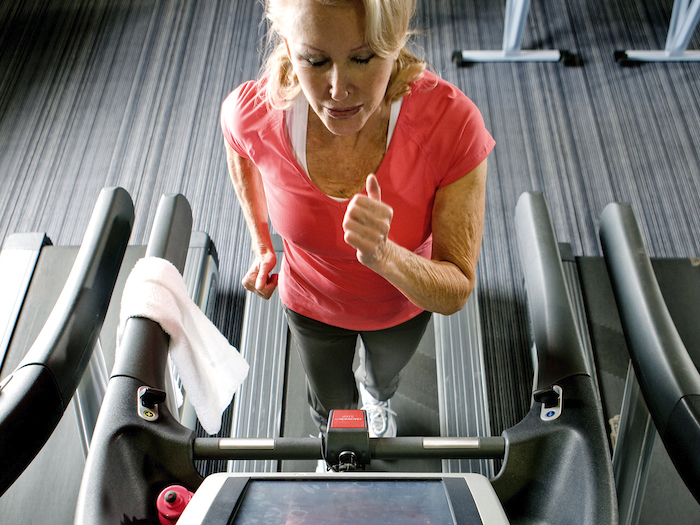Is HIIT Safe for Older Adults?
The short answer: Yes. But beginners need to take a few precautions. Here’s why.

Some people really enjoy long workouts. For others, it’s all about efficiency.
If you fall into the latter group, HIIT might be a great option for you. It gets you in and out of the gym as quickly as possible, and it’s safe at any age—provided you do it right. Here’s what you should know before you jump-squat in.
What Is HIIT?
HIIT stands for high-intensity interval training. It involves alternating short, intense bouts of activity with brief recovery stints, and you can do it with almost any type of exercise.
For instance, if you’re a runner, you could sprint really hard for 20 seconds, walk for one minute, and keep alternating for a total of 20 minutes.
Varying the intensity in this way allows you to reap maximum results in minimal time. HIIT workouts are often 30 minutes or less. In that time, you’ll build strength, fry fat, and improve your cardiovascular fitness.
The Potential Downsides of HIIT
Better results in less time sounds great, but for HIIT to work, the intense part of your routine has to be really, really intense.
“It’s pushing to a point where an individual finds this peak in their ability,” says Robert Linkul, C.P.T., head personal trainer and owner of Be STRONGER Fitness in Sacramento, California.
Because HIIT requires you to go hard and fast, you can push past your limits if you’re not careful. Ignoring your body’s signals to ease up can make you dizzy or nauseous, and you might even injure yourself.
“If there’s too much focus on pushing yourself and hurrying through, you could end up sacrificing technique and body mechanics, and people get hurt from that,” Linkul says.
Common injuries include torn ligaments, swollen muscles, and even slipped discs. Research also shows that HIIT can affect balance and increase the risk of a fall up to 30 minutes following a workout.
How to Do HIIT Safely
Given his cautionary notes, you might assume that Linkul is opposed to HIIT, but he’s actually a big fan. More than 130 older clients train in his gym, and all of them do HIIT once or twice per week.
The key in deciding whether HIIT is right for you isn’t your age, Linkul says. It’s your current level of conditioning.
If you’re new to HIIT, it’s best to ease into it. He suggests that people who are relatively healthy but not very active at the moment start by spending at least three months in the weight room. This beginner’s guide to the gym can help you get started.
Subscribe to our newsletter
It's quick and easy. You could be one of the 13 million people who are eligible.
Already a member? Click to discover our 15,000+ participating locations.
Follow Us
After you’ve built a solid foundation of strength, flexibility, and core stability, then you can start to incorporate HIIT into your workouts.
Linkul also says that older adults who are interested in HIIT should strongly consider working with a personal trainer, at least in the beginning. A pro can identify the best exercises for you to incorporate into your intervals and determine how much rest you need in between.
For example, if you’re new to HIIT, you might start with a 10-minute circuit in the gym, like this strong-and-stable core workout, and give yourself a full minute to recover in between rounds. The following week, you might reduce your rest period to 40 seconds, and so on.
The main takeaway: HIIT is safe and beneficial for most people, but it needs to be implemented the right way. “We want you to feel good after you finish your workout,” Linkul says.
Check Your SilverSneakers Eligibility Instantly
SilverSneakers members can go to thousands of gyms and fitness locations across the nation, plus take exercise classes designed for seniors and led by supportive instructors. If you have a Medicare Plan, it may include SilverSneakers—at no additional cost. Check your eligibility instantly here.
Already a member? Get your SilverSneakers member ID and exclusive fitness content by logging in to or creating your online account here.




